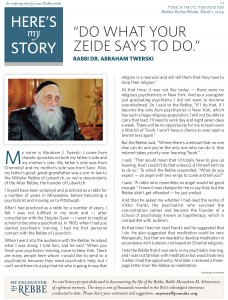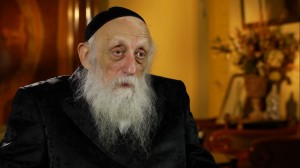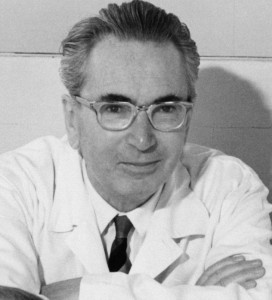HMS: “Do What Your Zeide Says To Do.”
My name is Abraham J. Twerski. I come from chasidic dynasties on both my father’s side and my mother’s side. My father’s side was from Chernobyl and my mother’s side was from Sanz. Also, my father’s great- great-grandfather was a son-in-law to the Mitteler Rebbe of Lubavitch, so we’re descendants of the Alter Rebbe, the founder of Lubavitch.
I myself have been ordained and practiced as a rabbi for a number of years in Milwaukee, before becoming a psychiatrist and moving on to Pittsburgh.
After I had practiced as a rabbi for a number of years, I felt I was not fulfilled in my work and – after consultation with the Steipler Gaon – I went to medical school to become a psychiatrist. In 1960, when I had just started psychiatric training, I had my first personal contact with the Rebbe of Lubavitch.
When I went into the audience with the Rebbe, he asked what I was doing. I told him, and he said “When you finish your psychiatric training, move to New York. There are many people here whom I would like to send to a psychiatrist because they need psychiatric help, but I can’t send them to a psychiatrist who is going to say that religion is a neurosis and will tell them that they have to drop their religion.”
At that time, it was not like today – there were no religious psychiatrists in New York. And as a youngster just graduating psychiatry, I did not want to become overwhelmed. So I said to the Rebbe, “If I do that, if I become the only frum psychiatrist in New York, which has such a huge religious population, I will not be able to carry that load. I’ll need to work day and night seven days a week. There will be no opportunity for me to learn even a little bit of Torah. I won’t have a chance to ever open a Jewish text again.”
But the Rebbe said, “Where there’s a mitzvah that no one else can do and you’re the only one who can do it, that mitzvah takes priority over learning Torah.”
I said, “That would mean that I’d totally have to give up learning. And I couldn’t do that unless G-d Himself told me to do so.” To which the Rebbe responded, “What do you expect – an angel with two wings to come and tell you?”
I said, “A rabbi who resembles an angel would be good enough.” I know it was chutzpa for me to say that, but the Rebbe didn’t get offended – he just smiled.
And then he asked me whether I had read the works of Viktor Frankl, the psychiatrist who survived the concentration camps and became the founder of a school of psychology known as logotherapy, which is compatible with Judaism.
At that time I had not read Frankl, and he suggested that I do. He also suggested that meditation could be very therapeutic, but that we needed to develop meditation in accordance with Judaism, not based on Oriental religions.
I told the Rebbe that it was early in my psychiatric training, and I was not familiar with meditation but would look into it when I had the opportunity. And later, I received a three-page letter from the Rebbe on meditation.
So that was my first audience with the Rebbe. And I must say that the Rebbe was very impressive. When he listened to me, I knew he was really listening and taking in every word that I said, and thinking before responding.
After that first meeting, my encounters with the Rebbe were very brief – I stood in line with the crowds to receive a dollar from him and a blessing from him – and yet I felt that I had a special connection to him.
This feeling was reinforced by what happened one Hoshana Rabba. At that time, I was acquainted with a Chabad chasid in Pittsburgh, Rav Shalom Posner, who regularly visited the Rebbe. I asked him, when he went, to please get for me a piece of lekah, the honey cake that the Rebbe would give out before the High Holidays. So he did – he told the Rebbe that he wanted a piece of cake for Doctor Twerski and the Rebbe gave it to him. But then the Rebbe called him back and gave him another piece, saying, “And this piece is for Rabbi Twerski.”
That was an indication to me where I stood with the Rebbe.
Also, the Rebbe sent patients to me. That is, he used to tell people to go to a rofeh yedid – a doctor who is a friend of the patient – and I was designated as the rofeh yedid, or as one of the rofeh yedid.
As well, I would send patients to the Rebbe, because I saw the psychological impact that he had on people. Whether he had specifically studied psychology, I don’t know, but the Chazon Ish never studied medicine, yet he would give instructions to surgeons how to operate – he had gotten all his knowledge out of the Torah. So, too, with the Rebbe. He had knowledge in this area and perhaps he got all of it from the Torah, which is the ultimate source.
My gut feeling was that he had a way of making people feel special because he treated them as special.
This reminds me of a story about my little granddaughter, who wrote to the Rebbe when she was about nine years old. All the girls in her class were lighting Shabbos candles, but it was the tradition in our family that a girl should not begin lighting until she was twelve, after her Bas Mitzvah.
So she went ahead on her own and she wrote a letter to the Rebbe: “Dear Rebbe, all the girls in my class light one candle before Shabbos but my Zeide says that in our family we don’t do it until Bas Mitzvah. What should I do?”
Now, you know how many questions the Rebbe was bombarded with day and night! And yet, two days later a letter came from him: “Do what your Zeide says to do.”
She came to me, and I saw how much she wanted to do it, so I agreed. But I was so impressed that the Rebbe took the time out to answer a question of a nine-year-old child, when he had the whole world beseeching him with questions on major issues.
It goes to show how special everyone was to him, and it also goes to show that he understood the psychological impact very well – what it would mean for a child to get a personal response from the Rebbe.
Rabbi Dr. Abraham J. Twerski, is a psychiatrist and author, and the founder of Gateway Rehabilitation Center, based in Pittsburgh. He was interviewed in Teaneck, New Jersey in January, 2012.
This has been dedicated








No Comments to “HMS: “Do What Your Zeide Says To Do.””